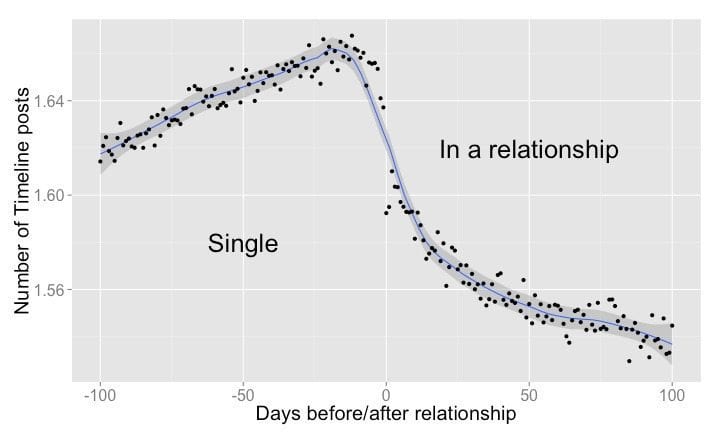 It’s Valentine’s Day, so of course, love is in the air, and on the Internet, too. From Google’s This American Life themed doodle to ecards and lots of flower and chocolate Instagram pics, it seems like everyone is getting in the spirit. Including Facebook, though not in the way you might think.
It’s Valentine’s Day, so of course, love is in the air, and on the Internet, too. From Google’s This American Life themed doodle to ecards and lots of flower and chocolate Instagram pics, it seems like everyone is getting in the spirit. Including Facebook, though not in the way you might think.
Today, Facebook released new stats that hint when two people are about to change their status to “in a relationship.” There have been rumors for years that for kicks, Mark Zuckerberg checks out people’s behind-the-scenes Facebook activity to predict who has a crush on who and who will end up in a relationship. Turns out, Facebook really can predict who will end up in a relationship based on how they act when on Facebook.
In the three months or so before a couple updates their relationship statuses to make it “Facebook official,” the Facebook data-machine can see a steady increase in the number of timeline posts between the two lovers. Posting to each other’s timelines will peak (1.67 posts) at 12 days before the relationship begins on Facebook. When the update is officially made, posts start to decline. Perhaps the magic is over?
When collecting the data, Facebook only looked at couples that declared an anniversary date (and not just changed their relationship status) between 4/11/2010 and 10/21/2013 and remained single 100 days before and in a relationship 100 days after the anniversary date.
These specific stats are part of a larger, six-part series that looks at love. “Presumably, couples decide to spend more time together, courtship is off, and online interactions give way to more interactions in the physical world,” Facebook wrote on their blog.
So, the fact that posts drop off after the couple makes it “Facebook official” isn’t a bad thing. The posts they share with each other tend to get sweeter and more positive after the status update. They use words like “love,” “nice,” and “happy.” They rarely use words like “hurt,” “hate,” and “bad.” Perhaps it’s because, now that it’s out in the open, the couple feels more comfortable expressing themselves on each other’s public walls. Or, maybe it really is just an increase in good feelings. Either way, the data doesn’t lie.
Twitter also released some love-themed data today, showing which countries and U.S. regions tweeted the most about being in love. Israeli Twitter users say “I love you” the most, followed by users in Sweden, Norway, Spain, and Hungary. In the U.S., people in New York state, Michigan, and Nevada say “I love you” the most. Montanta, Idaho, Nebraska, and New Hampshire say “I love you” the least.










